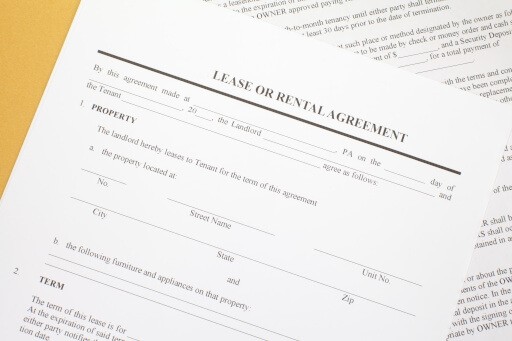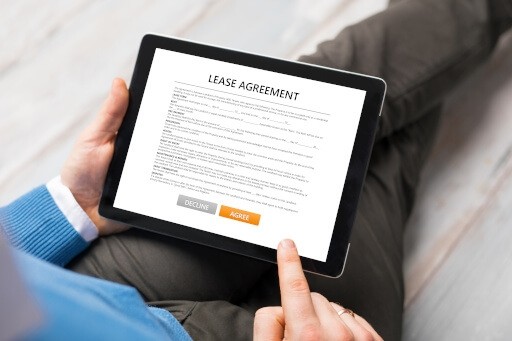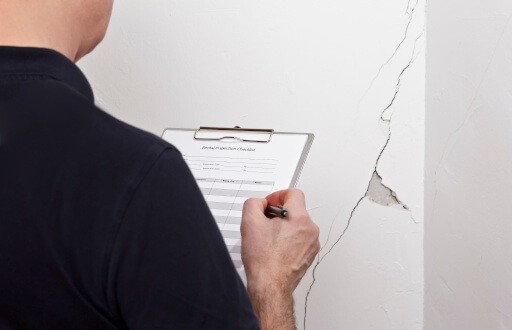
All tenants will welcome friends and family into their home at some point. Whether it’s an old friend dropping by for a night or inviting the family over for a quick stay, most tenants will have guests stay over sometime during the lease.
However, some guests may overstay their welcome, which begs the question: When does a guest become a tenant in a rental home?
What’s the Difference Between a Guest and a Tenant?
The critical difference between a guest and a tenant is a tenant is on the lease, and a guest is not. A tenant is held responsible for paying rent on time, as well as following the terms and conditions of the lease agreement and preventing any damage to the property. A guest, however, is not contractually bound to the terms of the lease agreement. Therefore, a guest can be a liability if they begin to act like a tenant when they are not.
Issues will arise if a guest establishes residency in the property a tenant is renting without the landlord’s permission. Tenants have the right to host guests, but not long-term guests who have turned into rogue tenants.
It is crucial for any adult occupant living in the unit to be on the lease. Otherwise, they have no legal accountability for your property.
Examples of Tenants Versus Guests
College kids
- Tenant: Returning home for the summer or because they are no longer in school
- Guest: Returning home for weekends, spring/winter breaks, but always goes back to school afterward
Elderly parents
- Tenant: Moving in with children for a few months or because they can no longer live alone
- Guest: Visiting children for a few weeks, helping with a new child, or assisting in-home repairs
Significant other or friend
- Tenant: Spending most days and nights there for weeks/months at a time
- Guest: Only visiting during the day and occasionally at night
Nanny or hired help
- Tenant: Nanny or hired help that lives with family
- Guest: Only on-site during regular business hours or occasional nights
Au pair
- Tenant: Living on the property
- Guest: By definition, they live with the family, so they will always be a tenant
Other cases
Tenants may allow guests into their home under different circumstances:
- Subletting: Tenants may sublease their house if they go on vacation or a long trip. To prevent subletting, write a clause against subletting in your lease agreement.
- Renting Rooms: If your tenant has an extra bedroom, they may rent a room to someone for a few weeks or months. To prevent this from happening, write a clause against renting rooms in your lease agreement.
State-by-State Law for Guests Establishing Residency
Alabama: After occupying rental for 30 days
Alaska: As specified in the lease agreement
Arizona: Any occupancy greater than 29 days
Arkansas: As specified in the lease agreement
California: 14+ days in six months or seven consecutive nights
Colorado: After occupying a rental for more than two weeks within six-months
Connecticut: After occupying a rental for more than two weeks within six months
Delaware: As specified in the lease agreement
Florida: 14 days in six months or seven nights in a row
Georgia:
- The guest pays some of the rent
- If the landlord accepts the guest for their stay
- If the guest helps with chores and housework
Hawaii: As specified in the lease agreement
Idaho: As specified in the lease agreement
Illinois: If the guest establishes residency without gaining permission from the property owner or landlord, i.e. receiving mail or putting the property address on their ID or license.
Indiana: After occupying rental for 30 days
Iowa: As specified in the lease agreement
Kansas: After 30 days or as specified in the lease agreement
Kentucky: As specified in the lease agreement
Louisiana: As specified in the lease agreement
Maine:
- Renting without a lease turns a guest into a “tenant at will”
- After 10 days to two weeks within six months
Maryland:
- When a guest pays rent to stay at the property
- Exchange of services for a place to live
Massachusetts: As specified in the lease agreement
Michigan: As specified in the lease agreement
Minnesota:
- A guest who lives in the home with the landlord’s permission
- Exchange of rent or services for a place to live
Mississippi: A guest who pays rent on time in exchange for inhabiting the property, even with no lease agreement
Missouri:
- A guest who stays on the property for more than two weeks within 12 months
- After 30 days
Montana:
- A guest who surpasses a temporary period as described in the rental lease agreement
- If not defined in the rental agreement, then after seven days, unless the landlord extends the period with written consent
Nebraska: As specified in the lease agreement
Nevada: As specified in the lease agreement
New Hampshire: As specified in the lease agreement
New Jersey: As specified in the lease agreement
New Mexico: As specified in the lease agreement
New York: After occupying a property for 30 days
North Carolina: After two weeks
North Dakota: As specified in the lease agreement
Ohio: After 30 days
Oklahoma: After a few weeks or as specified in the lease agreement
Oregon: After 14 days, within six-months
Pennsylvania:
- Paying money to the landlord in exchange for inhabitation of the property
- After 30 days
Rhode Island: As specified in the lease agreement
South Carolina: As specified in the lease agreement
South Dakota: As specified in the lease agreement
Tennessee: As specified in the lease agreement
Texas:
- After a set amount of days as defined in the lease agreement
- If the guest contributes to the rent, expenses, or utilities
- If the guest uses your property as their mailing address
Utah: As specified in the lease agreement
Vermont: As specified in the lease agreement
Virginia: As specified in the lease agreement
Washington: As specified in the lease agreement
West Virginia: As specified in the lease agreement
Wisconsin: As specified in the lease agreement
Wyoming: As specified in the lease agreement
Warning Signs of a Guest-Turned-Tenant
If it becomes clear to you the guest is:
- Moving in
- Helping the tenant pay rent while also living at the property
- Receiving mail at the property
- Spending every night at the property
- Parking their car at the property
- Making maintenance requests
then it's likely this guest has established residency on your property without your approval.
How long a guest can stay in a rental before they become a tenant differs by state, so check out your state laws to research this issue further. The lease should also address the amount of time a guest can stay, such as no more than 10-14 days in a six-month period.
Should I Add the Guest to the Lease?
It's essential for any adult occupant living in the property to be on the lease. This protects your right to know who's living on your property and your tenant from becoming liable for any damage their guest-turned-roommate causes.
Although confrontation can be uncomfortable, many landlords prefer to ask the current tenant to add the new roommate to the lease. Yes, this may be an awkward conversation, but it’s also an opportunity to clear the air and discuss what the cost of rent will be and what the lease will look like with an added tenant.
The alternative is to serve the original tenant with a lease violation notice that threatens to terminate the agreement. However, we suggest discussing the long-term guest with your tenant before getting to this severe extent.
How to Prevent Long-Term Guests?
Guest policy
The best way to prevent long-term guests is by writing a guest policy into your lease. If you use Apartments.com Rental Tools to generate a lease, the guest policy will be under "Rules and Regulations." Leases created with Apartments.com are fully customizable, state compliant, and legally binding.
The policy states: “A. A guest remaining overnight on the premises more than 14 consecutive days shall be conclusively deemed an unapproved subtenant under the rental agreement.” And “G. Tenant shall refrain, and ensure his guests and invitees refrain, from any conduct which a reasonable person would deem likely to annoy or disturb other residents, while in the rental unit itself, or the common areas and parking facilities.”
If you want to change the wording of the policy, you can always add an addendum or upload your own lease.
Here's an example of what to put in your lease regarding long-term guests:
USE OF PREMISES.
The Premises shall be used and occupied by Tenant(s), for no more than FIVE (5) persons exclusively, as a private individual dwelling, and no part of the Premises shall be used at any time during the term of this Agreement by Tenant(s) to carry on any business, profession, or trade of any kind, or for any purpose other than a private dwelling.
Tenant(s) shall not allow any other person, other than Tenant’s immediate family or transient relatives and friends who are guests of Tenant(s), to use or occupy the Premises without first obtaining Landlord’s written consent to such use. Any guest staying in the property more than two weeks in any six-month period will be considered a tenant, rather than a guest, and must be added in the lease agreement. Landlord may also increase the rent at any such time that a new tenant is added to the lease or premise.
Tenant(s) and guest(s) shall comply with any and all laws, ordinances, rules, and orders of any and all governmental or quasi-governmental authorities affecting the cleanliness, use, occupancy, and preservation of the Premises.
If you accept rent from a guest, you might have initiated a landlord-tenant relationship. If that is true, your new tenant might now have the same rights as any other tenant and will not be easy to remove, unlike a regular long-term guest. Because of this, it’s very important landlords do not take rent money from someone who is not on the lease. It’s wise to consult an attorney before the issue warrants one. That way, you can proceed with the right course of action as directed by the attorney and your state laws.
Have a conversation
If your tenant still allows long-term guests, it’s time to have a candid conversation with the current tenant about what is and is not allowed per the lease agreement.
FAQs
Should I accept rent from a guest?
No, do not accept rent from guests; this could put you at risk for legal issues. You should only collect rental payments from people on the lease.
Can I tell my tenant's guests not to come to the home?
As a landlord, you have the right to establish rules in your Guest Policy, including who is allowed to visit. But you should be mindful of your tenant’s rights according to your state and local laws.
If you have concerns about how long your tenant’s guest stays, then first start by having a conversation and referring to your lease. If the issue persists and violates the terms of the lease, further action such as issuing a warning or sending a notice to cure, may be required.
Can I evict a tenant if they refuse to add their guest to the lease?
Yes, if you have tried multiple times with your tenant and they refuse to add their guest to the lease, you can start the process of eviction. Since eviction is a complicated and often expensive process, it should be used as a last resort.
Overall, it is important to identify long-term guests because they can be a liability to you and your rental home. Finally, if tenants are allowing long- term guests, it means they are in violation of the lease agreement, and you will want to take the necessary steps to resolve the situation.
This article was originally published on June 7, 2022.











